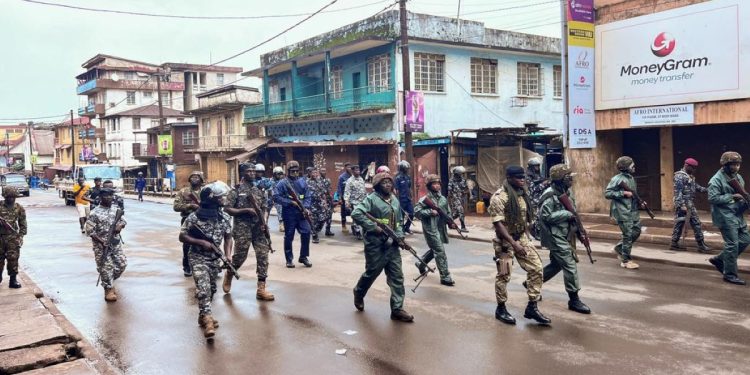By Albert David
In a nation still reeling from the trauma of electoral disputes, economic hardship, and a devastating drug crisis, the recent rhetoric from Sierra Leone’s political elite, particularly the Sierra Leone People’s Party (SLPP) National Chairman’s incendiary invocation of the army, police, “Marshall,” “soja team,” Maada Base, Bundara, and even the presidency to “do everything possible to stop the main opposition All People’s Congress – APC”, is not only deeply troubling, but ethically indefensible.
To suggest that such references are mere metaphors for party supporters, as attempted by the SLPP’s Organizing Secretary, is a dangerously deceptive reframing. It insults the intelligence of the public and trivializes the grave implications of politicizing institutions that are constitutionally mandated to remain apolitical. The military and police are not partisan tools. They are guardians of national security, public trust, and democratic order. To drag them into political warfare—whether literally or rhetorically—is to flirt with incitement, intimidation, and suppression.
A Precedent of Fear, Not Freedom
If this language is allowed to stand unchallenged, it sets a devastating precedent. It normalizes thuggery. It weaponizes institutions. It pollutes civic space with fear and deception rather than protecting it with law and reason. It emboldens violent actors and silences dissenting voices. It erodes the very fabric of democratic governance and undermines the principles of national cohesion and ethical political communication.
This is not just an SLPP problem. The APC, too, has engaged in inflammatory rhetoric that stokes tribal divisions and fuels political antagonism. When opposition leaders resort to threats, insults, and provocative declarations, they contribute to the same toxic climate. Sierra Leone does not need a war of words it needs a war on poverty, corruption, and despair.
A Nation Distracted from Its True Tragedies
While political actors trade barbs and mobilize loyalists, the nation suffers. The drug crisis continues to ravage communities, especially youth. Unemployment remains staggeringly high. Access to basic necessities, clean water, electricity, healthcare, is still a daily struggle for millions. These are the real emergencies. These are the issues that demand urgent, united attention.
Instead, the political discourse is dominated by intimidation, suppression, and deception. This not only undermines national security, it repels foreign investment. No investor will place confidence in a country where institutions are politicized, civic space is unstable, and leadership is more concerned with silencing opponents than solving problems.
Sierra Leone must reclaim its democratic dignity. Political leaders must be held to a higher standard of ethical communication. They must speak not as party warriors, but as national stewards. They must build public trust, not erode it. They must foster unity, not division.
Journalists, Civil Society Organizations, and citizens must demand accountability. They must challenge misleading narratives, expose unethical conduct, and educate the public on the principles of good governance. Silence is complicity. And complicity is betrayal.
This is a moment of reckoning. Sierra Leone stands at a crossroads. Will it continue down the path of politicized institutions, violent rhetoric, and national fragmentation? Or will it rise, through courage, clarity, and conviction, to build a nation rooted in law, reason, and ethical leadership?
The answer lies not in metaphors, but in action. Not in intimidation, but in integrity. Not in suppression, but in solidarity.
Let us choose wisely. Let us speak truth. Let us build peace.











